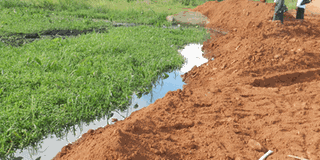Prime
Wetlands: Uganda’s fast disappearing green resource

Part of a wetland in the inner Murchison Bay that was destroyed by a developer. File photo
What you need to know:
One of the biggest areas being encroached upon today are wetlands. Statistics show that for most districts in Uganda, wetland areas are being lost by the hectare over the years.
As Uganda joins the rest of the world in commemorating World Environment Day, the state of the environment remains worrying, with environmentalists now acknowledging that the country could be losing a grip on environment protection.
World Environment Day is used to celebrate gains made in environment protection and to reflect and bring to public awareness what is not being done well. This year’s theme is “Green Economy: Does it include you?”
In Kampala alone, nearly all wetlands have been encroached on and the few remaining ones under attack.
About two acres of the wetland forming part of the inner Murchison Bay, bordering Luzira Industrial Park in Nakawa Division, has been discretely degraded with soil while another part of Nakivubo Channel and an access road connecting to Namuwongo through Bugolobi has been blocked with water including areas along Lake Victoria shores, which are also currently being filled for a golf course.
Some of the areas that have been degraded include that near Lugogo trade show grounds, Kitante golf club, Nakawa industrial area, Owino Market area, the area in which Golf Course Hotel sits, Centenary Park and Munyonyo recreation grounds.
According to the Director, Directorate of Wetlands at the Ministry of Water and Environment, Paul Mafabi, it has really been a tug of war between developers and the ministries. This is because developers are usually given land titles in the wetland and it becomes difficult to evict them. “Giving titles in wetlands is a big problem we are fighting and we are constantly clashing with developers. We have written to the Uganda Land Commission and the National Environment Management Authority to consider cancelling land titles in such areas but none has been cancelled yet,” Mafabi said, adding that development can be achieved without disturbing the environment as long as there is proper planning.
He however believes that with the forming of the Environment Police and demarcation of wetland boundaries, things should change for the better.
However, Mr Taire Idwege, the Environment Police Commandant, says the environment police would be doing a better job if there was no interference giving land titles in a wetland.
“When we go for inspection and we find a person with a land title, our hands are tied,” Mr Idwege said.
Aside from the wetlands, air quality in Kampala and other parts of the country is wanting, Lake Victoria shores are heavily filled with algae as a result of pollution. This, the environmentalist says, is posing a danger to aquatic life in the lake. According to Tom Okurut, Nema Executive Director, there have not been proper guidelines to monitor air quality but they are trying to make interventions using international guidelines.
Also, statistics from the latest National Biomass Study shows that the country loses 90,000 hectares of forest cover each year yet both the National Forest Authority and private tree planters were planting only 35,000 hectares of trees per year.
National Environment Management Authority (Nema) attributes the failure of government to protect all the country’s environment to population pressure and few Nema inspectors.
“Uganda’s population is among the fastest growing populations but the land has not increased. That has brought problems,” Okurut, says.
He adds they have people who apply for permits to use protected areas in the best way but abuse them in the long run while others forge permits to degrade protected areas.
He says they have made interventions to help protect the environment in various places but Kampala still has a challenge that they need to address.
According to Mr David Musinguzi, the Chairman of Uganda Wildlife Clubs of Uganda, who also doubles as Educational Officer Uganda Wildlife Clubs, Uganda boasts of Ramsar sites but they have all been degraded by estate developers and politicians.
“As we celebrate this day, people need to be more patriotic because patriotism does not stop in political parties but includes the environment as well,” he notes.




